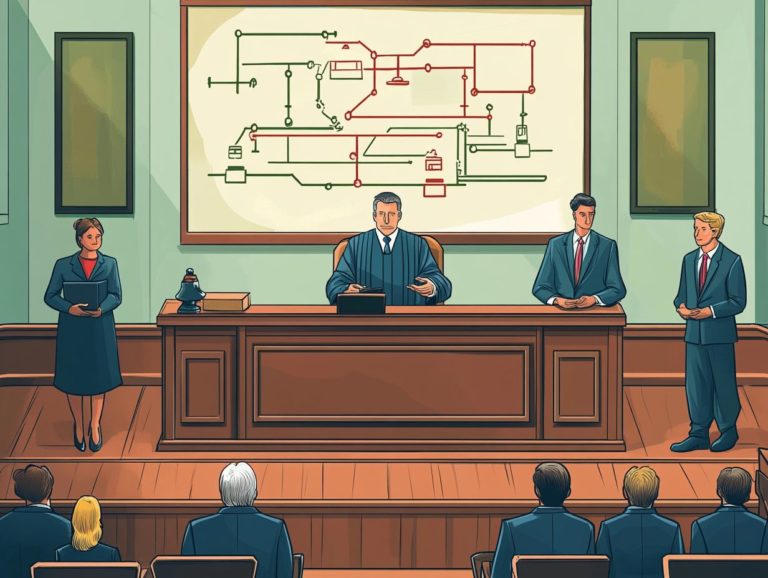How to Prepare an IP Litigation Budget
Navigating the intricate landscape of intellectual property (IP) litigation can feel overwhelming, particularly when it comes to budgeting. An effective IP litigation budget is crucial for managing costs while ensuring you have a robust legal strategy in place.
This article delves into the essence of an IP litigation budget. It examines the key factors that influence its formulation and provides practical tips for managing expenses effectively.
Whether you’re a business owner or a legal professional, grasping these elements will empower you to maximize value and minimize financial surprises along the way.
Contents
- Key Takeaways:
- Understanding IP Litigation Budgets
- Factors to Consider in Creating an IP Litigation Budget
- Creating an Effective IP Litigation Budget
- Managing and Tracking Expenses
- Tips for Negotiating and Reducing Costs
- Preguntas Frecuentes
- Qu es un presupuesto para litigios de propiedad intelectual (IP)?
- Por qu es importante preparar un presupuesto para litigios de IP?
- Qui n es responsable de preparar un presupuesto para litigios de IP?
- Qu factores deben considerarse al preparar un presupuesto para litigios de IP?
- C mo puedo asegurar un presupuesto para litigios de IP preciso?
- Qu debo hacer si se excede mi presupuesto para litigios de IP?
Key Takeaways:

- Understand the components of an IP litigation budget.
- Create a budget by considering all relevant factors.
- Manage expenses using tools and strategies to stay on track.
- Negotiate and reduce costs by maximizing value from legal services.
Understanding IP Litigation Budgets
Understanding IP litigation budgets is essential for organizations looking to manage their legal expenses efficiently. A well-structured budget not only saves you money but also sets the stage for success in your case, especially when you know how to protect your IP rights during litigation!
This budget outlines the anticipated costs associated with the litigation process. It aligns seamlessly with the broader objectives set by the executive leadership team.
A clear budget framework helps you make informed decisions about resource allocation, including outside counsel, expert witnesses, and discovery costs.
This proactive approach can significantly elevate the effectiveness of your litigation and communication strategies throughout the legal proceedings.
What is an IP Litigation Budget?
An IP litigation budget acts as your financial blueprint. It clearly outlines the anticipated costs and expenses tied to legal disputes over intellectual property. This budget is crucial for steering your decisions throughout the legal process.
Within this budget, you ll typically find specific categories, such as:
- Outside counsel fees: These cover the hourly rates and retainer costs for hiring legal experts who can navigate the complexities of your case.
- Expert witness costs: These can significantly impact your overall budget, as these professionals provide invaluable insights that can make or break a case.
- Discovery costs: These encompass expenses related to gathering and reviewing evidence and are often among the largest financial components.
By implementing effective case management practices, you can streamline operations and minimize unnecessary expenditures. This will help you stick to your budget while optimizing your legal spend.
Factors to Consider in Creating an IP Litigation Budget
Developing a comprehensive IP litigation budget necessitates careful evaluation of several critical factors that can greatly affect your overall costs and resource allocation, especially when considering how to prepare for an IP litigation case.
By considering these elements, you can ensure a well-structured financial plan that supports your strategic objectives.
Scope of the Case
The scope of your case defines the boundaries and extent of the legal challenges you face in an IP litigation matter. Grasping this scope is essential, as it directly influences your litigation budget.
A case that involves multiple complex issues may necessitate extensive research, expert testimonies, and a plethora of legal documents. All of these can significantly drive up costs. For example, if your company is confronting infringement claims on several patents instead of just one, your legal team will need to dedicate additional resources to dissect the intricacies of each patent.
If the litigation spans international jurisdictions, it requires specialized expertise. This illustrates how a broader scope invariably leads to increased financial demands.
Ready to create your IP litigation budget? Let s get started today!
Complexity of the Legal Issues

The legal issues around IP litigation can greatly impact your budget and strategies. You must understand patent laws, trademark rights, and copyright matters.
Navigating these issues involves dealing with many different documents, expert testimonies, and regulatory rules. You need specialized legal expertise to handle these complexities.
Effective mediation planning can change the game. It helps you reach amicable resolutions without inflating costs.
Expert Witness Fees
Expert witness fees play a crucial role in your litigation budget. They often account for a significant portion of the legal expenses incurred in IP litigation.
These fees can fluctuate widely based on the expert’s credentials, experience, and how directly relevant their expertise is to your case.
For example, a highly qualified expert with a stellar track record in IP may command higher fees due to their specialized knowledge.
It’s vital for legal teams like yours to engage in strategic planning to budget these costs effectively. Ensure they align with your broader litigation objectives.
By assessing the necessity of expert testimony and its potential impact on case outcomes, you can make informed decisions that enhance your overall litigation strategy.
Discovery Costs
Discovery costs encompass various expenses tied to the gathering and exchanging of evidence during litigation. They are essential considerations in your litigation budget.
These costs can stem from different elements, such as electronic discovery often known as ESI which involves identifying, preserving, collecting, and reviewing digital evidence.
Navigating the Federal Rules of Civil Procedure adds complexity and expense, as ensuring compliance requires meticulous documentation and data management.
To effectively manage these costs, consider strategies such as:
- Early case assessment
- Leveraging technology for efficient data processing
- Negotiating with vendors to secure better rates on e-discovery services
Implementing a proactive budget plan that highlights potential expenses can help streamline the discovery phase. This reduces financial strain throughout the litigation process.
Creating an Effective IP Litigation Budget
Developing an effective IP litigation budget requires a meticulous approach to budget management. You need to assess various factors to ensure your legal team can effectively carry out its litigation strategies, especially when considering what to expect during an IP litigation process.
Key Components and Considerations
When crafting an IP litigation budget, incorporate not just anticipated legal fees but also other crucial elements that play a significant role in successful trial preparation.
A well-rounded budget will clearly outline various fee arrangements with outside counsel. Keep in mind that these can differ greatly, whether through hourly rates or flat fees.
It s vital to anticipate costs related to trial preparation, including expert witness fees, document discovery, and potential deposition expenses.
Build in allowances for unexpected costs like last-minute motions or a surge in discovery requests. This ensures your budget remains flexible.
By carefully considering these factors, you can create a more precise financial forecast. This helps you navigate the intricacies of litigation while minimizing any financial surprises that may arise.
Managing and Tracking Expenses

Take control of your costs now! Effective management and tracking of your expenses are essential for maintaining control over your litigation budget.
By diligently monitoring costs, you can ensure they remain within your initial estimates, safeguarding against unexpected financial surprises.
Tools and Strategies for Staying on Budget
Utilizing the right tools and strategies to stay on budget can significantly enhance your financial management of intellectual property lawsuits. This enables your legal team to navigate legal expenditures with confidence.
By leveraging advanced budget management software, you can track expenses in real-time. This makes it easier to adjust allocations as necessary.
Implementing collaborative communication platforms fosters transparency. This allows all team members to access and discuss budgetary allocations without misunderstandings.
Proactive strategies like regular budget reviews and forecasting sessions ensure that your team remains aligned on financial goals. This holistic approach strengthens accountability and enables you to make informed decisions that keep you firmly within your budgetary limits.
Tips for Negotiating and Reducing Costs
Negotiating effectively and discovering avenues to reduce costs are vital skills for legal teams. These skills enhance value while diligently managing their litigation budgets.
Mastering these abilities can significantly elevate your practice, ensuring you achieve the best outcomes without compromising financial integrity.
Maximizing Value from Legal Services
Maximizing value from legal services demands strategic planning and a keen understanding of how to align these services with your organization’s budget goals.
To achieve this, establish a system for evaluating outside counsel performance. Ensure that every engagement meets clear benchmarks for efficiency and effectiveness.
Optimizing resource allocation by discerning the most suitable in-house versus external resources can lead to significant cost savings without sacrificing quality.
It’s essential that the legal services you utilize directly align with your overarching litigation objectives. This enhances both your strategic approach and the measurable outcomes of each case.
By fostering regular communication and feedback loops, you can ensure that your legal efforts remain focused and adaptable as the landscape evolves.
Preguntas Frecuentes
Qu es un presupuesto para litigios de propiedad intelectual (IP)?

Un presupuesto para litigios de IP es un plan financiero que describe los costos estimados asociados con un conflicto legal relacionado con la propiedad intelectual. Incluye gastos como honorarios de abogados, tasas judiciales, honorarios de testigos expertos y otros costos relacionados.
Por qu es importante preparar un presupuesto para litigios de IP?
Preparar un presupuesto para litigios de IP es importante porque te ayuda a entender y planificar los costos potenciales de un conflicto legal. Tambi n te permite establecer un presupuesto realista y evitar gastos inesperados que podr an afectar negativamente tu negocio.
Qui n es responsable de preparar un presupuesto para litigios de IP?
La responsabilidad de preparar un presupuesto para litigios de IP generalmente recae en el equipo legal que representa al demandante o al demandado. Sin embargo, el cliente o la empresa involucrada en la disputa tambi n debe participar activamente en el proceso de presupuestaci n.
Qu factores deben considerarse al preparar un presupuesto para litigios de IP?
Al preparar un presupuesto para litigios de IP, se deben tener en cuenta factores como la complejidad del caso, el n mero de partes involucradas, los posibles honorarios de testigos expertos y la jurisdicci n del tribunal. Tambi n es importante considerar cualquier costo potencial de acuerdo o apelaci n.
C mo puedo asegurar un presupuesto para litigios de IP preciso?
Para asegurar un presupuesto para litigios de IP preciso, es importante trabajar estrechamente con tu equipo legal y proporcionarles toda la informaci n necesaria. Haz un seguimiento de todos los gastos y revisa y actualiza regularmente el presupuesto a medida que avanza el caso.
Qu debo hacer si se excede mi presupuesto para litigios de IP?
Si se excede tu presupuesto para litigios de IP, es importante discutir esto con tu equipo legal y determinar si se pueden hacer ajustes. Tambi n puede ser necesario revisar tu presupuesto y realizar los cambios necesarios para evitar excederlo en el futuro.






